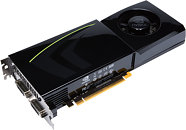Friday, March 14th 2014

NVIDIA Outlines Support Plans for its DirectX 10 Generation GPUs
With its next-generation "Maxwell" GPUs on the horizon, NVIDIA is preparing plans to gradually retire the GeForce 8 series, 9 series, and 200 series from its mainline driver support model. The GPUs make up NVIDIA's DirectX 10 generation, and include some iconic models, such as the 8800 GTX, the 8800 GT, the 9600 GT, and the GTX 260. The upcoming GeForce Release 340 driver will be the last to support these GPU series alongside its newer DirectX 11 generations, such as "Fermi," "Kepler," and "Maxwell." The driver that succeeds it, R343, will drop support for the older DirectX 10 generation.
With the R340 release, the DirectX 10 generation will be market "legacy." The lot will see continued support under R340 till April 2016. Whenever there's a glaring bug or security hole to address for the older GPUs, NVIDIA may ship out an R340 version (340.xx), but the GPUs will not get planned driver updates, unlike the "current" DirectX 11 generation. Support cycles are hence different from production cycle. A GeForce GTX 480, for example, may be "EOL" (end of life) in terms of its production cycle, but is still "current" in terms of its support cycle.
Source:
NVIDIA
With the R340 release, the DirectX 10 generation will be market "legacy." The lot will see continued support under R340 till April 2016. Whenever there's a glaring bug or security hole to address for the older GPUs, NVIDIA may ship out an R340 version (340.xx), but the GPUs will not get planned driver updates, unlike the "current" DirectX 11 generation. Support cycles are hence different from production cycle. A GeForce GTX 480, for example, may be "EOL" (end of life) in terms of its production cycle, but is still "current" in terms of its support cycle.

45 Comments on NVIDIA Outlines Support Plans for its DirectX 10 Generation GPUs
edit: after a look anything pre 5000 series on AMD side had support dropped for it back in march 2012. 12.3 was last driver for 4000 series and older to the 2000 series
now it's praise for nvidia? couple years sure makes a strange difference...
(sure i'm generalizing, the legacy amd driver is a joke, old bugs arent fixed for years, they just had to drop support mere months before CCC revamped the profiles feature, yadayada
what bugged me was how almost nobody bothered to notice that dx9 cards went on scheduled legacy, dx8 cards went legacy, it wasnt as big of a shock as most made it out to seem)
The main problems that were blamed on Vista weren't actually a fault of Vista/Microsoft.
The three main complaints were:
AMD simply doesn't do long term support. They never have. You get about 4 years of semi competence and then it's over.
I didn't know it was a widespread issue though.
but it's not about performance, let's say CF or SLI had real nice scaling so you could have 4 or 6 cards, let's say they're over half a decade old dx9 only, let's say this combination was faster than a 7970 at the witcher 2, but the gpu architecture is too far behind, holding back the driver architecture or simply bloating it & adding extra time to test it
although in reality, the gpus werent that different, 6900 & GCN are the ones that had big changes, so i expect the next legacy to drop everything before GCN (but wait, we didnt get a GCN APU until recently, so that might take a while)
then there's the question of what 'support' even means, a number increasing every month doesnt make it useful at all, so i would say that if they made a WHQL windows 8 driver & fixed the big bugs that appeared after 2011 (2nd gpu clock issue, frostbite2 performance issue, added the new CCC profiles feature), then that would be a good way to go legacy which would have happened merely a few months later in fall 2012
but even with the few months early cliffhanger, we still have some regular people helping out, packaging up frankenstein drivers or posting workarounds for the bugs, so it's not like the cards turned off www.techpowerup.com/forums/threads/best-drivers-for-a-4870x2.196863/#post-3050692
on the game side, i couldnt enjoy anything dx11 anyway, more drivers wouldnt have solved that
right now i'm on a 570m, it's a little faster than a single 4870 so in a way i havent had to downgrade when my 4870x2 died :laugh:
When AMD/ATI stop or reduce support you guys bitch and moan and complain for 10 pages. But when NVidia do it, its OK?
Basically, the Nvidia boards are covered a little over twice as long as those from AMD...that is the comparison people are making, and of course, a 3-4 year old card likely has more current gaming relevance than a 7-9.5 year old one
Pretty amazing it was supported so long.
Any issue you may have had was because software manufacturers didn't want to rewrite their software and hardware manufacturers couldn't be bothered to rewrite their drivers. But once the third party companies were on-board (didn't take long) all the niggles was ironed out.